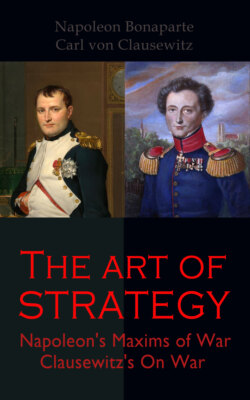Читать книгу The Art of Strategy: Napoleon's Maxims of War + Clausewitz's On War - Carl von Clausewitz - Страница 38
На сайте Литреса книга снята с продажи.
ОглавлениеMAXIM XXXIII.
Table of Contents
It is contrary to the usages of war to allow parks or batteries of artillery to enter a defile, unless you hold the other extremity. In case of retreat, the guns will embarrass your movements and be lost. They should be left in position, under a sufficient escort, until you are master of the opening.
NOTE.
Nothing encumbers the march of an army so much as a quantity of baggage. In the campaign of 1796, Napoleon abandoned his battering train under the walls of Mantua, after spiking the guns and destroying the carriages. By this sacrifice, he acquired a facility of manœuvring rapidly his little army, and obtained the initiative as well as a general superiority over the numerous but divided forces of Marshal Wurmser.
In 1799, during his retreat in Italy, General Moreau being compelled to manœuvre among the mountains, preferred separating himself entirely from his reserve artillery, which he directed upon France by the Col de Fenestrelle, rather than embarrass his march with this part of his equipment.
These are the examples we should follow; for if, by a rapidity of march, and a facility of concentration upon decisive points, the victory is gained, the materiel of an army is soon re-established. But if, on the other hand, we are beaten and compelled to retreat, it will be difficult to save our equipments, and we may have reason to congratulate ourselves that we abandoned them in time to prevent them from augmenting the trophies of the enemy.
